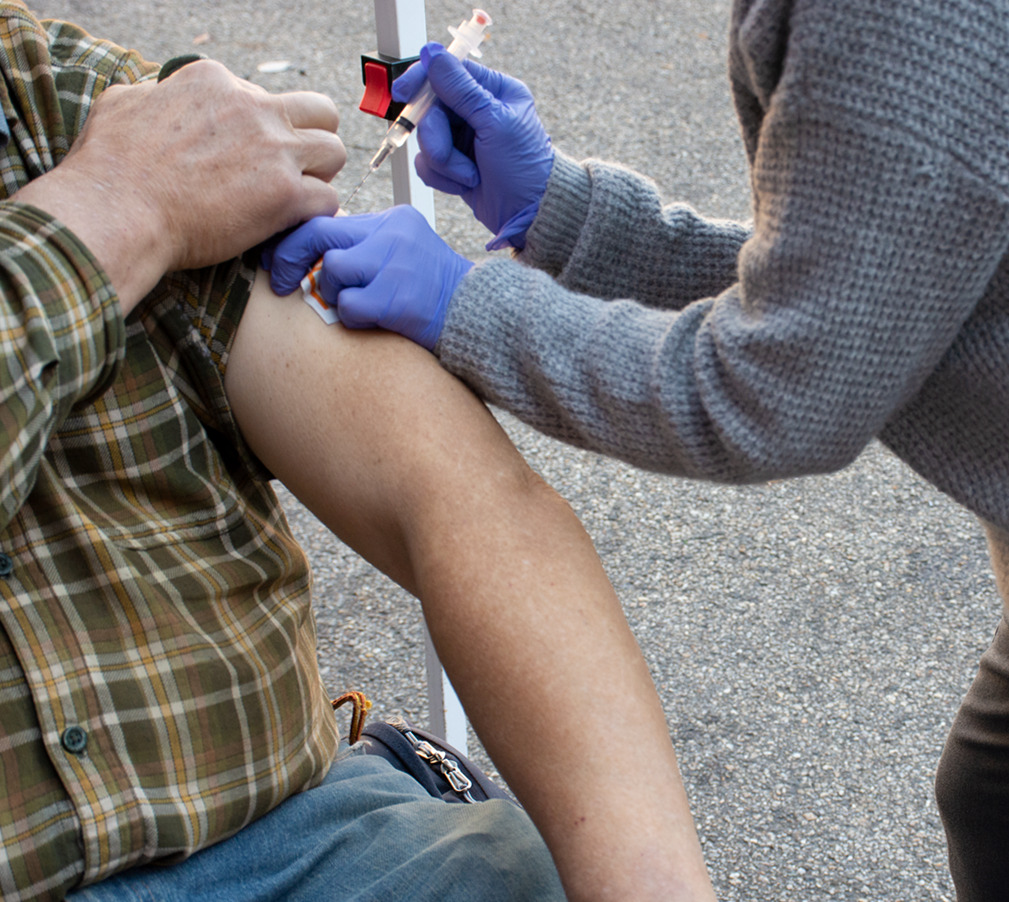The pandemic showed how emergency shelters for people experiencing homelessness are an important part of the public health infrastructure. These shelters, which are communal (congregate) spaces, remained open during the pandemic. Shelter staff and our partners in the healthcare industry expanded our work and services to keep our communities safe.
Three years after the first COVID case was confirmed in the U.S., the work to keep people safe and healthy continues. Coordinating with the larger shelter network in the state, Preble Street, Mid-Maine Homeless Shelters and Services, Knox County Homeless Coalition, and Milestone Recovery are collaborating to mitigate COVID spread and impacts in the homeless community, thanks to a new grant from DHHS.
This two-year grant has just begun, and the vision is to meet the immediate and emergent needs caused by the COVID pandemic while applying the lessons we’ve learned to other public health emergencies. “Flu and RSV are very prevalent right now, and we’re building collaboration for the long-term while focusing on the immediate needs for COVID,” says Andrew Volkers (they/them), COVID-19 Mitigation Supervisor, Preble Street Health Services. “COVID mitigation is in a very interesting spot right now, because we’ve learned so much over the last few years. Now we have the knowledge built up, but we’re losing a lot of the resources and funding that we had access to.”
Shelter providers, public health stakeholders, hospital providers, and others who have been involved in the COVID response for this population now meet monthly to share relevant updates and brainstorm solutions to problems that arise.
“The other big deliverable of this work is to create an easily accessible resource directory that’s updated frequently and contains comprehensive guidance on social support needs or testing needs or vaccination needs or even guidance on isolation or quarantine,” shares Volkers, who just started pursuing a Master of Public Health. “Things change so rapidly, both with our population and the social conditions, but also the COVID conditions change. You never know when a new variant is coming.”
One resource that has been lost over this past year is Quarantine and Isolation shelters, which provided a safe space for people to quarantine when exposed to or sick from COVID-19. Over 22 months, 800 individuals were served at the Scarborough Quarantine and Isolation shelter, amounting to more than 900 unique quarantine stays, and more than 7,500 bed nights. That’s more than 800 individuals who had access to safe shelter, reducing the spread of COVID-19 and helping keep our communities safe during incredibly difficult times.
Volkers’ experience working at Florence House and the quarantine shelters helps as they now work with several Preble Street programs, including Elena’s Way, Teen Services, and the site-based Housing First programs, to make sure they have a plan in place for handling any COVID cases. Based on the experience with prior outbreaks and alongside the program management, each program has a flowchart and checklists so that as soon as there is a COVID case, staff can take advantage of the resources they have stocked up and begin testing. “If a program has a positive case in a shelter I’ll go over there after about two days, just so that we can account for possible spread and test anyone who may want a test or had an exposure,” shares Volkers. “Vaccination, masking, and testing are really the three best ways to prevent COVID and mitigate COVID.”
Preble Street hopes that one lasting outcome of the COVID-19 pandemic will be the continued collaboration with public health stakeholders, especially as the homelessness crisis continues to grow. Cumberland District Public Health Council has formed a working group on the current crisis that we face with the end of Emergency Rental Assistance. And over the last few months of summer 2022, Portland Public Health hosted public health fairs at Deering Oaks Park, which included health screenings and meetings with public health providers, STD screenings, needle exchange, harm reduction support, supplies, and vaccinations and also brought a collaboration of case management partners out to the park.
“There was tremendous partnership between the public sector at the state level and the nonprofit sector,” shares Mark Swann (he/him), Preble Street Executive Director. “The pandemic really brought out everyone’s best selves and I am hopeful that we will take all of the lessons learned — the good and the bad — and do better work moving forward. That’s what we do to really help people.”
If you are unsheltered and need help…
The MMC-Preble Street Learning Collaborative offers a basic needs room aimed at serving unsheltered individuals (Monday through Friday 10-11:30 am) and distributes toiletries, socks, underwear, snacks, and seasonal items (such as hand warmers for cold weather or sunscreen for summer), Narcan, and any other items that may be able to meet a need. Other services available include mail for established Learning Collaborative clients, assistance obtaining SNAP/MaineCare, case management referrals on Tuesdays with Street Outreach, and COVID education.

